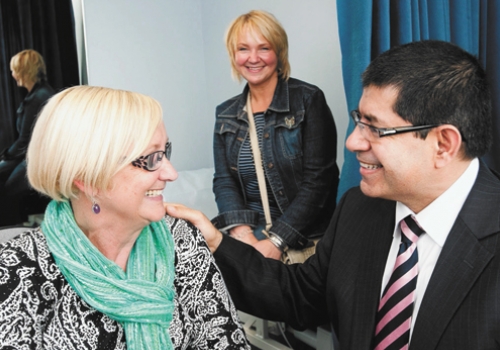Home >> News >> 2011 >> Oct >> Health News - Pioneering procedure trialled at Royal Free vastly increases effect of cancer-fighting drugs
Health News - Pioneering procedure trialled at Royal Free vastly increases effect of cancer-fighting drugs

Published: 6 October, 2011
by TOM FOOT
A CANCER treatment breakthrough at the Royal Free Hospital has brought new hope to patients in remission.
When Carol Wallis found out her breast cancer had returned – for the sixth time in 28 years – she feared she had run out of options.
So the 63-year-old grandmother agreed to become the first person to trial the Hampstead hospital’s special electro-chemotherapy treatment.
The technique uses electrical pulses to stimulate cancer cells, making them porous and more receptive to cancer-killing drugs.
It has only been used a handful of times in this country before but is now available at the Royal Free.
Hospital experts said just four weeks after having the treatment the cancer nodules in her chest had disappeared.
Ms Wallis, a retired dental nurse who has two daughters, said: “It was really rather frightening. I just felt like I was running out of things to try. I really didn’t want to go through another round of chemotherapy because the side effects for me have been terrible.”
Carol, from Oxfordshire, was first diagnosed with breast cancer in 1983 and tests revealed a gene linked to hereditary breast cancer.
She suffered further recurrences in 1998, 2001, 2002, and earlier this year.
During her battle with cancer, Carol has undergone partial mastectomies and later a double mastectomy, reconstructive surgery, chemotherapy and radiotherapy, as well as taking anti-cancer drugs including Tamoxifen.
She had extensive reconstructive surgery earlier this year, which took muscles and skin from her upper back to create a new breast.
She said: “I never want to tempt fate but it has given me hope.
“My daughter Lisa has inherited the faulty BRCA1 gene and I’ve four granddaughters who may or may not have inherited it.”
Consultant oncological surgeon Mo Keshtgar, who performed the procedure, said: “Essentially, electro-chemotherapy is a treatment which uses an old drug but with new tricks.
“The drug, which is called Bleomycin, is given to the patient intravenously. We then use a special electrode to target the tumour tissue with an electric field. This stimulates the cancer cells and increases their permeability by 8,000-fold – allowing more of the drug to enter the cells.”
The Royal Free has now become the national reference centre following success of the breast cancer therapy.
Mr Keshtgar added: “We will accept referrals from all over the country so that as many patients as possible can benefit from this exciting new treatment.”




Comments
Post new comment